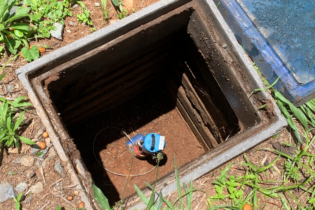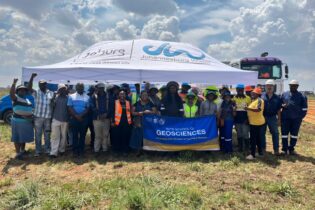The South African Institution of Civil Engineering (SAICE) expresses its deepest sympathy and horror at the senseless murder of a colleague, Geoff Sylvester, who spent much of his career bringing water to the poorest of the poor. Condolences to his family, and the institutions of which he was a member, i.e. the Institute of Municipal Engineering of Southern Africa (IMESA) and the Water Institute of Southern Africa (WISA).
At the time of his murder Geoff, as a professional civil engineering technologist, was working on an infrastructure project to bring water and sanitation services to the people in kwaMashu. In a short tribute to Geoff, BOSCH MUNiTCH, the company employing him, wrote, “There is a terrible sadness that this dignified and noble undertaking had a role to play in Geoff being torn from us.” Daily exposure to criminal acts where engineering practitioners are providing in the daily pressing need for water and sanitation in communities is, in fact, incomprehensible. And, it seems that acts of criminality happen on site more often than expected. Where civil engineering is second on government’s draft priority scarce skills list, our country cannot afford to lose a single engineer, whether moving to another country or because working circumstances in many of the three tiers of government are not conducive to creating a happy workplace, but certainly not by being shot and killed on a construction site. There are layers of impact in the workplace when something like this happens. Not only is this a traumatic event for the colleagues who worked closely with the person, those who knew him well in the industry, but it also causes managerial anxiety in companies. Among the questions arising, are whether female civil engineering practitioners should be deployed on site! Could they be more prone to attacks than male counterparts? Is it even possible to protect workers on remote sites? The daily exposure to all kinds of crime has made many insensitive and obtundent to the real situation in South Africa. When one reads that 42 farmers had been killed, some severely tortured, by 5 August this year, that in 2012/2013 48 police officers were killed, it eludes comprehension – it is in fact too traumatic to try and understand. However, for the civil engineering fraternity this is very close to home. One wonders how to be safe at home, in and around one’s car, and now on site while doing a job?The homicide figures over the past years sounded more like war casualties. Violence against women and children is rife. There are a lot of special days and months, lots of talk and processions to advocate safety for women and children, and yet there seems to be no decrease in the number of cases annually. What is an individual’s role and that of an institution such as SAICE in the reduction of violence, or even the role of an employer?
Could one of the reasons for criminality at all levels be found in the shocking estimate that between 30% and 40% of all learners entering Grade 1, fall out of the system and never reach Grade 8 (high school)?. These are the young people wandering the streets aimlessly, about whom the communities are concerned. They are in this situation because:• They have already failed the primary school grades (often two or three times).
• They cannot read and write.
• They cannot do maths/arithmetic.
• Schools are not equipped with enough remedial educators to cope with the numbers.
• All special schools, where these learners should go, are always full with waiting lists of two or more years.
• Primary schools do not or cannot assist in finding these learners help in the form of psychologists who can assess them in the first place!
• Primary schools do not assist in finding these learners places in special schools. South Africa cannot ignore this group. Nobody talks about them. Government programmes are aimed at those learners who have a matric or even Grade 10, but this aimless group is the forgotten generation. It is their time to be assisted and it needs to be done now. The socio-economic cost is too high if they are ignored. So, where does SAICE fit into all of this? The civil engineering and construction industries have a vast number of career options, and create job opportunities for unskilled people. However, the political will has to be there to roll out projects for the industry to play its role! Having said that, industry must be engaged at the outset of government’s planning initiatives. The Civilution Forum, consisting of various industry bodies, could interact with the infrastructure departments at national, provincial and local government level, to address these issues. SAICE has repeatedly implored government to make use of their members’ expertise in the planning and execution of projects! This is another request to government: We are here, we are willing and we are able to help our government create jobs, while reducing criminal activities that destroy families and communities, on our streets, and now on sites.





